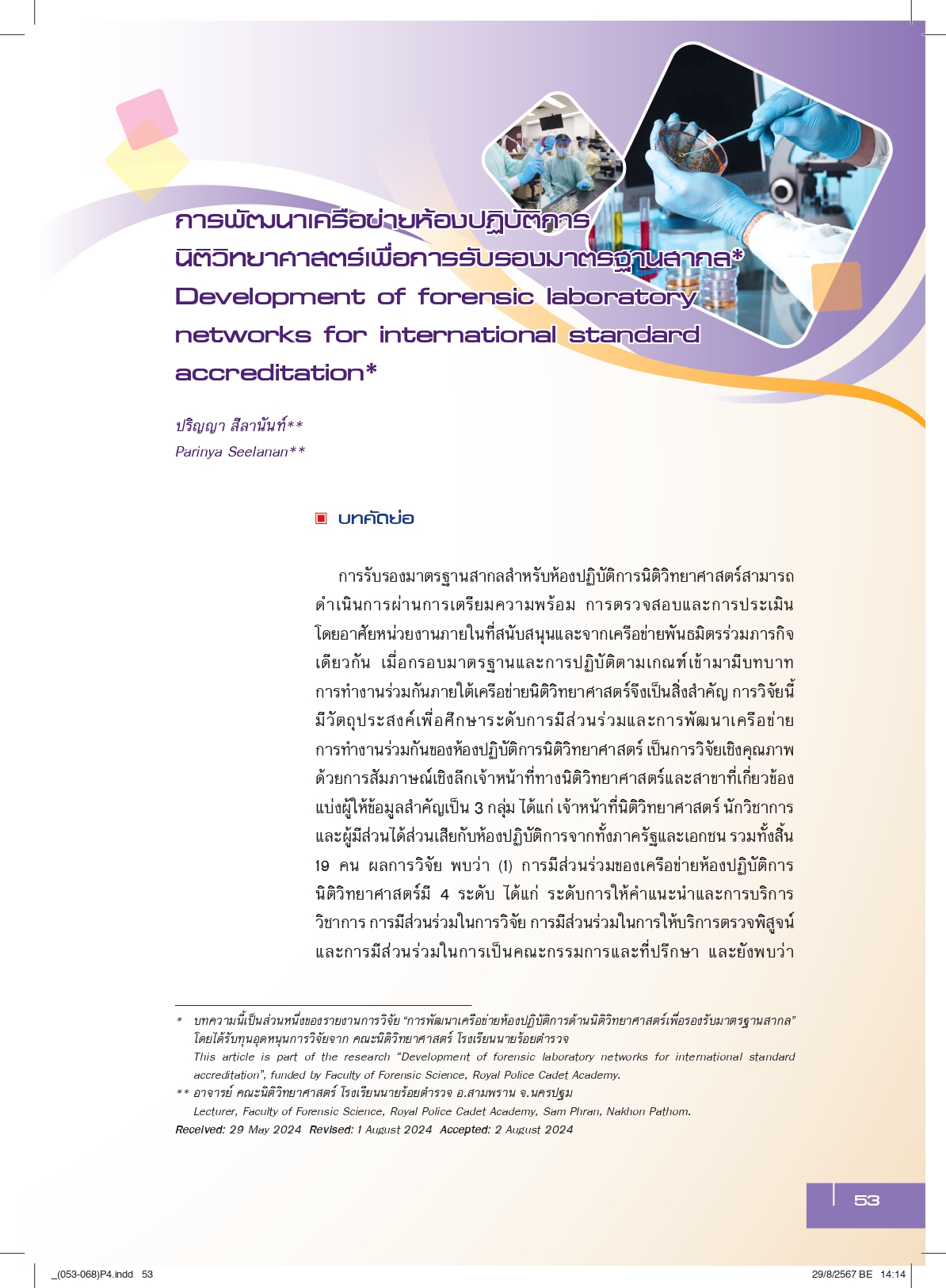Development of forensic laboratory networks for international standard accreditation
Main Article Content
บทคัดย่อ
The feasibility of international standard accreditation for forensic laboratories can be aligned through the process of preparation, audition and evaluation among internal supporting units and alliances with communal duties. Collaboration within forensic networks becomes more important when the standard guide and operation are involved. The participation level and development of forensic laboratory collaboration were examined as the research objectives. A qualitative study of officers who were engaged in forensic operations and related fields was performed via in-depth interviews. Three groups of key informants, a forensic officer, an academic researcher, and stakeholders from both the government and private sector for 19 persons in total, were interviewed and analyzed. It was found that (1) the participation level of the forensic laboratory collaboration were 4 levels which are academic and service consultation level, academic forming level, examination service level and committee and advised placation level; and (2) action guideline for the development of forensic laboratory collaborative network consists of 2 phases; Phase 1 which is short-term management of well-prepared equipment and competent-based training for the staffs and Phase 2, long-term development. Processes of the collaborative network for the long-term development involve participation in the regulatory and basis of the laboratory, enhancement on forensic examination scopes and measures, and separation of the unit administration from the laboratory facility. The strategy for long-term phase must be supported by interorganizational collaboration under the short-term management. Thus, the process model for standard accreditation guidelines was proposed. In summary, forensic laboratory is encouraged once the participation level and operations are evaluated and qualified. The standard accreditation can be achieved under forensic laboratory network and the participation based on the proposed model.
Article Details

อนุญาตภายใต้เงื่อนไข Creative Commons Attribution-NonCommercial-NoDerivatives 4.0 International License.
ต้นฉบับที่ได้รับการตีพิมพ์ในวารสาร เป็นลิขสิทธิ์ของวารสารกระบวนการยุติธรรม แต่ความคิดเห็นที่ปรากฏในเนื้อหาของบทความในวารสารกระบวนการยุติธรรม ถือเป็นความรับผิดชอบของผู้เขียนแต่เพียงผู้เดียว
เอกสารอ้างอิง
Akkakorn Chaiyapong, Vachiravitch Ittithanasuphavitch, Niramol Yindee, Worachat Kliangkaew, & Pairoj Boonsirikamchai. (2022). The study on scope of forensic science in Thailand and the number of forensic practitioners categorized by expertise of forensic science discipline. Journal of Thai Justice System, 15(1), 81-98.
Amornthap Phonrasuek, Sarit Suebpongsiri, & Chaichan Chairangsinant. (2020). The patterns and procedures of universal forensic science standard in the judicial process in Thailand. Kasem Bundit Journal, 21(1), 146-160.
Arnstein, S. R. (1969). A ladder of citizen participation. Journal of the American Institute of Planners, 35(4), 216-224.
Chaichan Chairangsinant. (2016). International standards accreditation for forensic science. Journal of Criminology and Forensic Science, 2(1), 60-71.
Cohen, J. M. & Uphoff, N. T. (1980). Participation's place in rural development: Seeking clarity through specificity. World Development, 8(3), 213-235.
Naiyana Wattanasri, Wannika Manoroma, & Somchai Viriyayudhagorn. (2010). Laboratory accreditation in Thailand: A systemic approach. American Journal of Clinical Pathology, 134(4), 534-540.
Patchara Sinloyma. (2015). The development of forensic science process model for criminal investigation in three southern border provinces of Thailand. Suan Dusit Graduate School Academic Journal, 11(2), 43-53.
Saferstein, R. (2009). Forensic science: From the crime scene to the crime lab (1st ed.). Pearson: Prentice Hall.
Sakolkrit Akejakrawan & Navapat Narongsak. (2022). The policy for promoting and developing forensic science services of the private sector in Thailand. Journal of Criminology and Forensic Science, 8(1), 1-16.
Sasiwimon Thongklom & Thamavit Terdudomtham. (2020). The optimal model of private criminalistics service in Thailand. Journal of Thai Justice System, 13(3), 1-20.
Waraporn Promwikorn. (2020). Standardizing forensic science system for Thailand reform. Journal of Southern Technology, 13(1), 200-219.
Wilson-Wilde, L. (2018). The international development of forensic science standards-a review. Forensic Science International, 288, 1-9.


